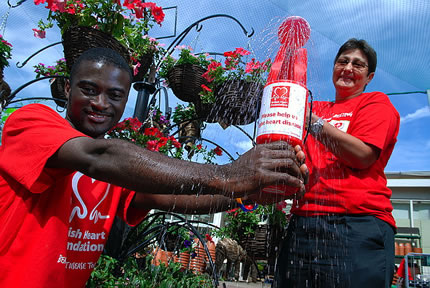Individuals in not-for-profit sector fail to capitalise on the benefits of volunteering
Managers in the not-for-profit sector fail to see how voluntary work boosts career opportunities and skills, despite high numbers giving up their time at home and abroad. According to research, published today by the Chartered Management Institute and VSO (Voluntary Service Overseas), individuals who volunteer internationally develop expertise that addresses UK skills gaps. And even though employers are quick to recognise the value of volunteering, individuals do not always market themselves sufficiently when they return home.
The research, which questioned 516 managers, revealed that the majority of managers (90 per cent) working in the not-for-profit sector are involved in voluntary activity. Altruism and the desire to help others was the top reason for volunteering both ‘at home’ (80 per cent) and internationally (56 per cent). However, the findings point to a missed opportunity as few considered the impact volunteer work could have on their career. Only 20 per cent saw it as a chance to build networks, just 11 per cent cited the prospect of learning new skills and 13 per cent said professional development was a motivating factor.
Yet the research, which also probed 100 former VSO volunteers through detailed interviews, demonstrated how international experience has a significant impact on skills development. Eighty percent of volunteers believed they returned with expertise that they would not have gained in the UK. Almost all (92 per cent) said they were now more capable of handling different cultures and three-quarters (74 per cent) suggested they became better communicators. Around half also claimed that voluntary work had developed problem solving abilities (57 per cent) and influencing skills (46 per cent).
These newly acquired skills have the potential to make managers in the not-for-profit sector significantly more employable as they directly address areas where organisations admit to the persistence of skills gaps. Diversity management (33 per cent) and communication (21 per cent) were identified, in the research, as key areas of shortage. One-third also reported difficulties in recruiting those skilled in conflict management (37 per cent) and managing change (41 per cent).
The report also indicates broad support from employers for those who have undertaken overseas volunteer activity, with 92 per cent agreeing or strongly agreeing that it increases skills and 60 per cent believing it increases employability. Many also accept that domestic (78 per cent) and long-term international (51 per cent) work can be an effective method of skills development. Key findings were:
– 92 per cent of managers in not-for-profit organisations said they would not be averse to employing someone who had recently returned from volunteering overseas
– of those who had employed a volunteer, 67 per cent agreed that they brought different skills and experience to the organisation in comparison to other employees
– 58 per cent of former volunteers said they had received a positive response from potential employers and just 5 per cent had difficulty in finding work
However, many respondents (36 per cent) also suggested that organisations would be more inclined to employ long-term volunteers if they could demonstrate formal recognition of how they made an impact. A similar number (44 per cent) felt references from overseas employers would make a difference. Former volunteers supported this by saying that in retrospect they felt it was important to present their volunteering as part of their career development.
Mary Chapman, chief executive of the Chartered Management Institute, says: “The findings offer powerful support for the benefits of voluntary activity and it is clear from this research that having a broad skill-set, the ability to communicate well and tackle difficult issues is critical for career success. Individuals should nurture these skills and consider how they record and recognise voluntary achievements in a way that attracts potential employers.”
Mark Goldring, Chief Executive at VSO, adds: “Managers must recognise that international volunteering can have reciprocal benefits and that by sharing their skills as a VSO volunteer not only can they play a significant role in the fight against poverty but they can also influence their future career and contribute to their company’s success. Former volunteers have suggested that their overseas experience gave them a confidence that opened doors to opportunities that some felt were previously beyond them. We urge individuals and employers to reconsider how volunteering can have a lasting impact on the lives of some of the most disadvantaged people in the world at the same time as influencing career progression.”
A report, called ‘Valuing Volunteering’, outlines the research in detail. It is available via
www.managers.org.uk/researchreports
In 2001 Ben Soppitt took a sabbatical from his job at Accenture and spent 12 months working as a small business adviser in Kazakhstan. On returning to UK he remained with Accenture for 18 months before moving on to work for GSM Association. Ben now manages a million dollar development fund that invests in projects in emerging markets, which use mobile technology and provide social or economic development. He directly attributes his career development to his time as a VSO volunteer.
– ends –
Further information:
Mike Petrook /Gemma Bird, Institute Press Office
Tel: 020 7497 0496
Email:pr**********@**********rg.uk
Website: www.managers.org.uk
Catherine Raynor/Leona Daly, VSO Press office
Tel: 020 8780 7285/7262
Email: ca**************@*****rg.uk Related posts



